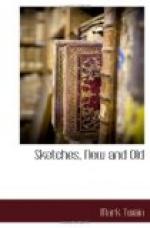I then left.
THE PETRIFIED MAN
Now, to show how really hard it is to foist a moral or a truth upon an unsuspecting public through a burlesque without entirely and absurdly missing one’s mark, I will here set down two experiences of my own in this thing. In the fall of 1862, in Nevada and California, the people got to running wild about extraordinary petrifactions and other natural marvels. One could scarcely pick up a paper without finding in it one or two glorified discoveries of this kind. The mania was becoming a little ridiculous. I was a brand-new local editor in Virginia City, and I felt called upon to destroy this growing evil; we all have our benignant, fatherly moods at one time or another, I suppose. I chose to kill the petrifaction mania with a delicate, a very delicate satire. But maybe it was altogether too delicate, for nobody ever perceived the satire part of it at all. I put my scheme in the shape of the discovery of a remarkably petrified man.
I had had a temporary falling out with Mr.——, the new coroner and justice of the peace of Humboldt, and thought I might as well touch him up a little at the same time and make him ridiculous, and thus combine pleasure with business. So I told, in patient, belief-compelling detail, all about the finding of a petrified-man at Gravelly Ford (exactly a hundred and twenty miles, over a breakneck mountain trail from where —— lived); how all the savants of the immediate neighborhood had been to examine it (it was notorious that there was not a living creature within fifty miles of there, except a few starving Indians; some crippled grasshoppers, and four or five buzzards out of meat and too feeble to get away); how those savants all pronounced the petrified man to have been in a state of complete petrifaction for over ten generations; and then, with a seriousness that I ought to have been ashamed to assume, I stated that as soon as Mr.——heard the news he summoned a jury, mounted his mule, and posted off, with noble reverence for official duty, on that awful five days’ journey, through alkali, sage brush, peril of body, and imminent starvation, to hold an inquest on this man that had been dead and turned to everlasting stone for more than three hundred years! And then, my hand being “in,” so to speak, I went on, with the same unflinching gravity, to state that the jury returned a verdict that deceased came to his death from protracted exposure. This only moved me to higher flights of imagination, and I said that the jury, with that charity so characteristic of pioneers, then dug a grave, and were about to give the petrified man Christian burial, when they found that for ages a limestone sediment had been trickling down the face of the stone against which he was sitting, and this stuff had run under him and cemented him fast to the “bed-rock”; that the jury (they were all silver-miners) canvassed the difficulty a moment, and then got out their powder and fuse, and proceeded to drill a hole under him, in order to blast him from his position, when Mr.——, “with that delicacy so characteristic of him, forbade them, observing that it would be little less than sacrilege to do such a thing.”




